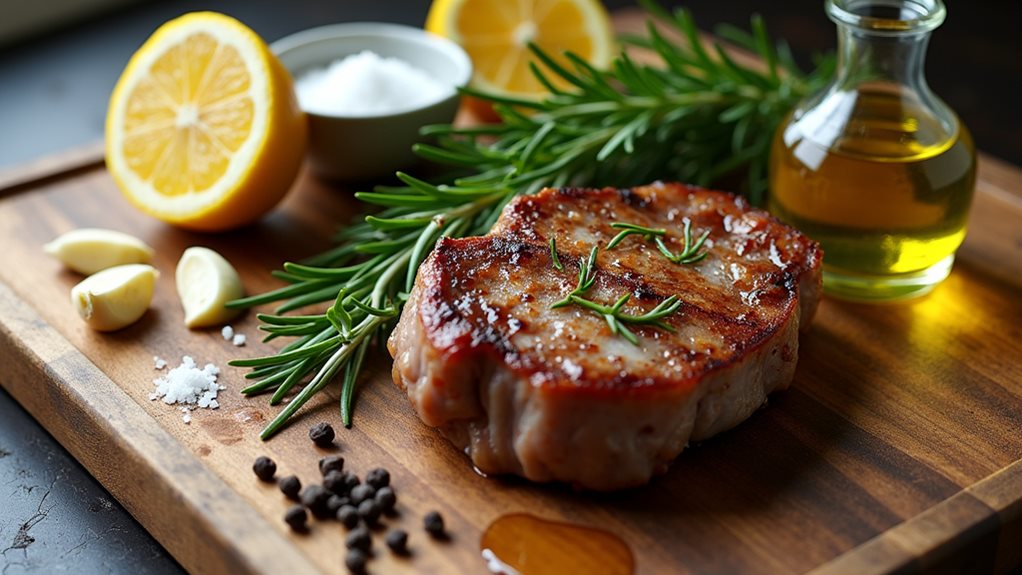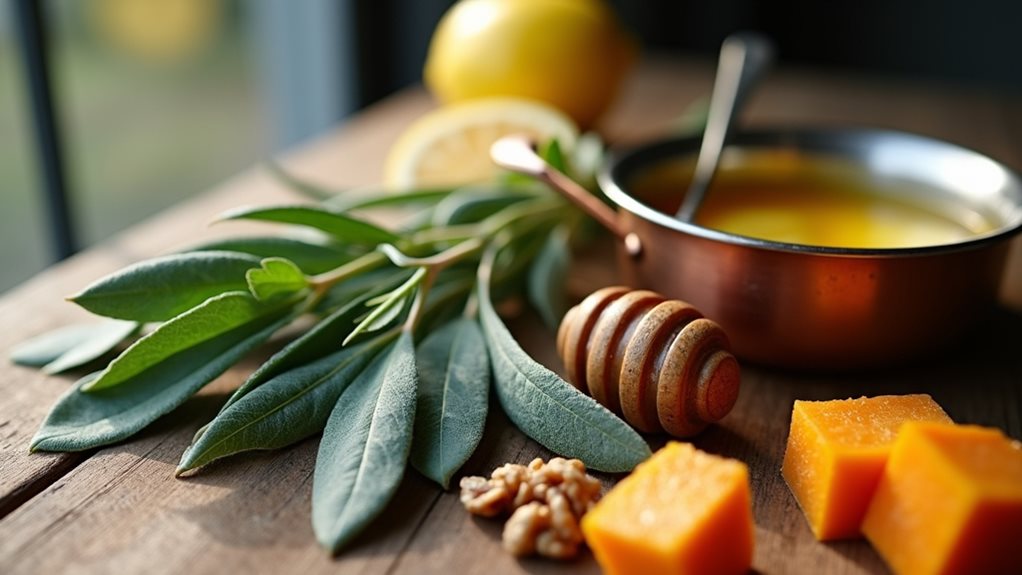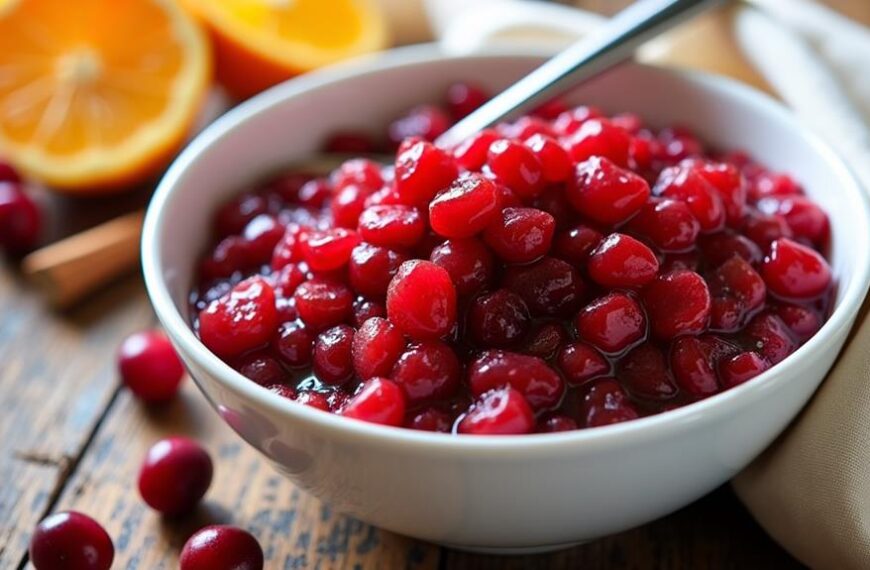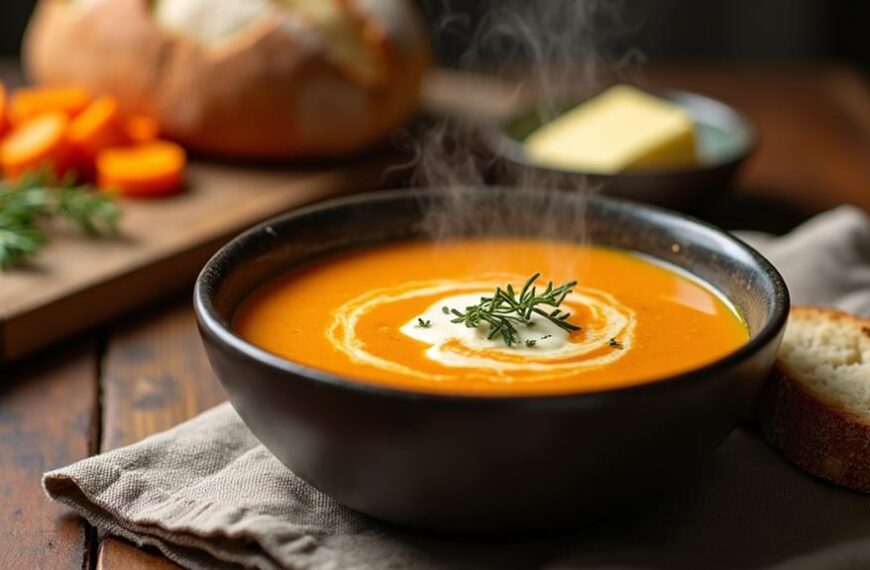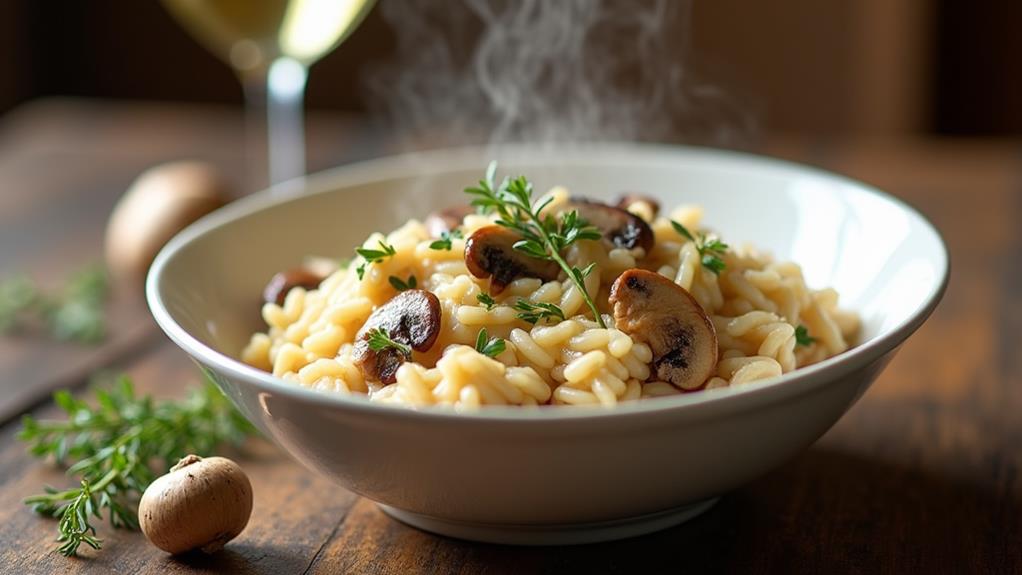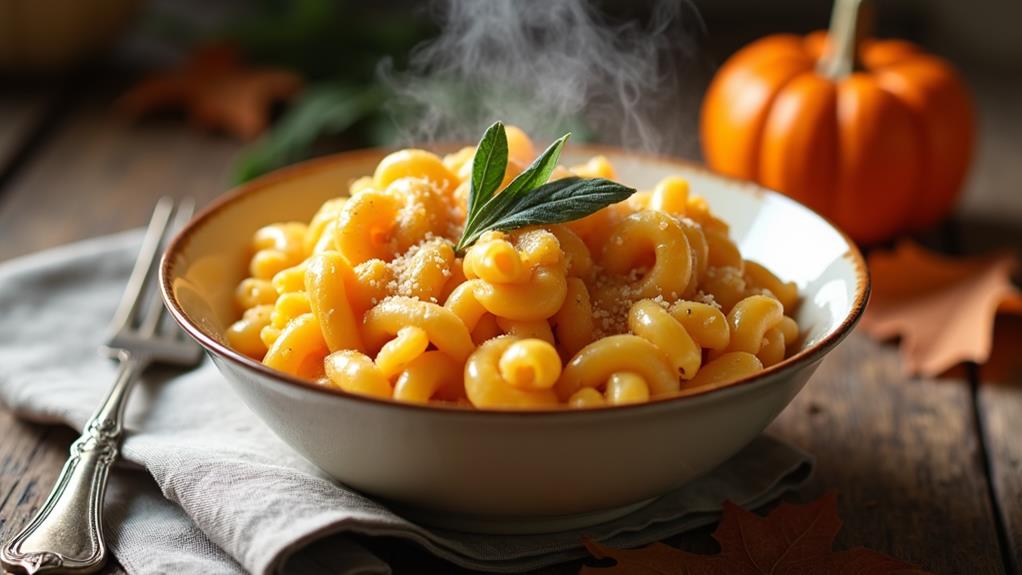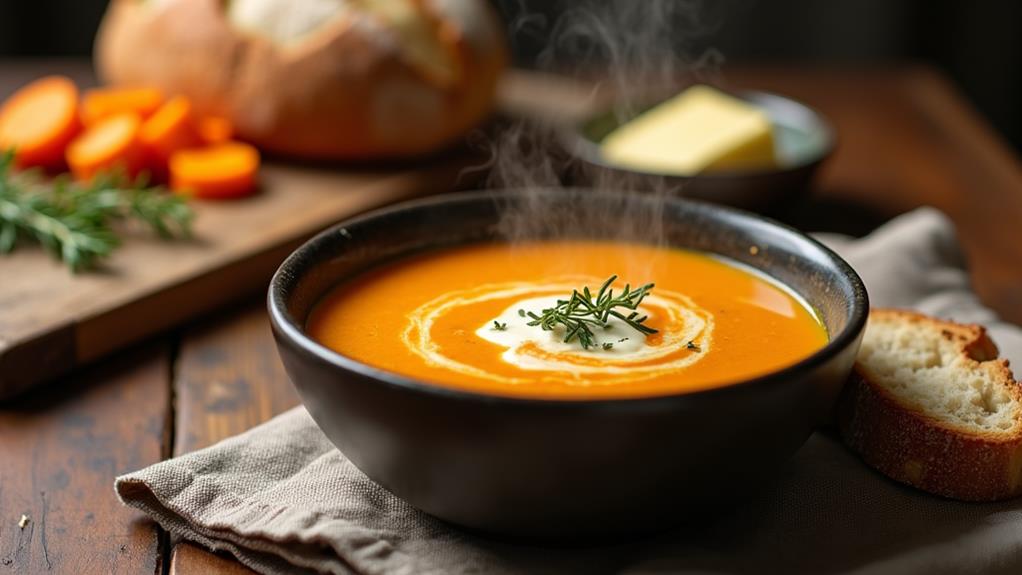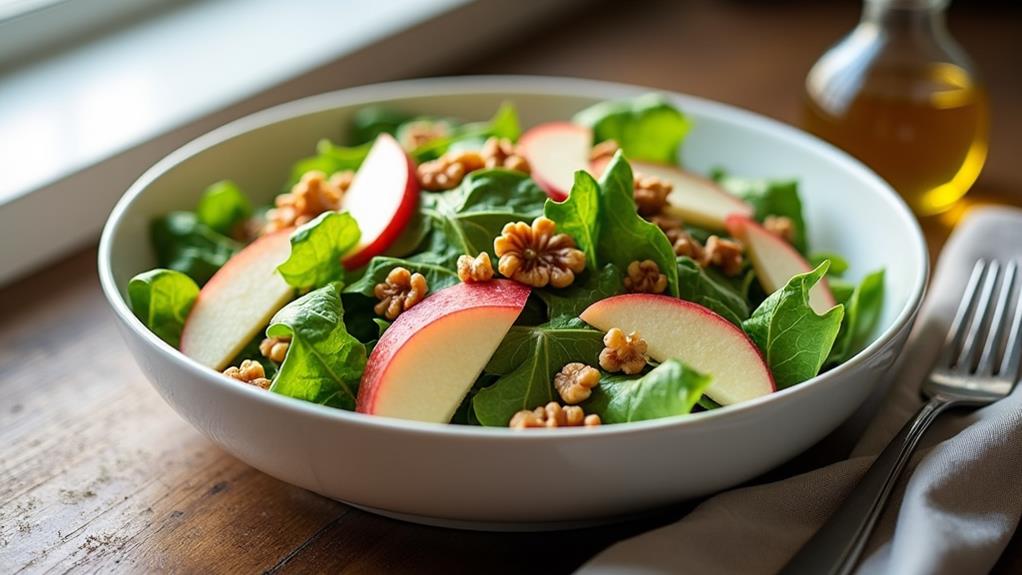Rosemary's earthy, piney flavor pairs beautifully with lamb, chicken, pork, and beef, especially when combined with garlic and citrus. You'll find it complements root vegetables, potatoes, and mushrooms wonderfully. For unexpected combinations, try rosemary with cheeses like Gruyère or sharp cheddar, or infuse it into desserts with chocolate, citrus, or honey. Its versatility extends to oils, vinegars, and wine reductions that can transform ordinary dishes into memorable culinary experiences.
Essential Flavor Characteristics of Rosemary
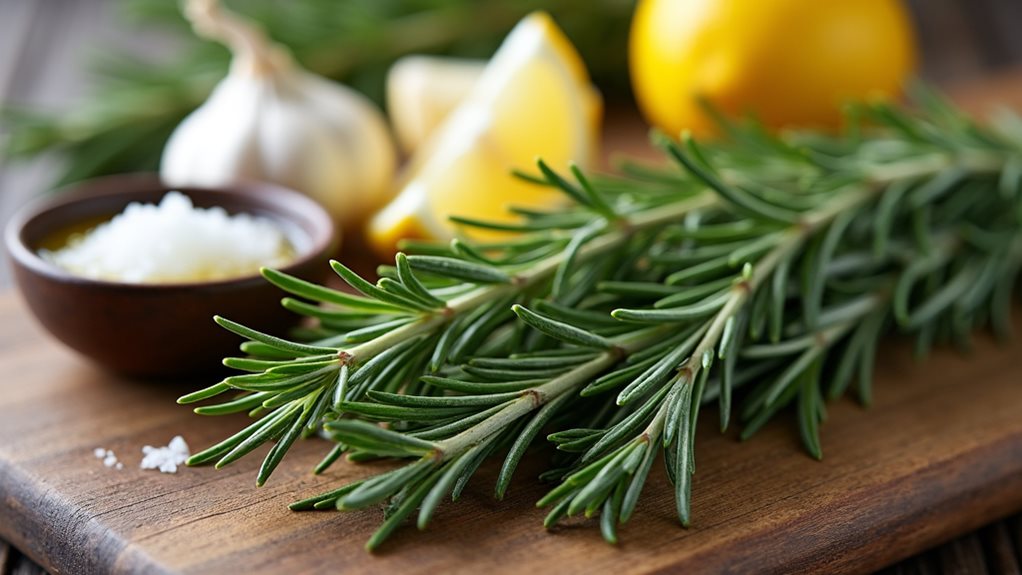
Rosemary's distinctive profile stands as one of the most recognizable herbs in Mediterranean cuisine, offering an earthy, woodsy flavor complemented by noticeable notes of pepper and lemon.
Unmistakably Mediterranean, rosemary delivers earthy depth with bright hints of citrus and spice in every aromatic sprig.
When you first encounter this herb, its powerful piney aroma immediately signals its culinary versatility. You'll notice subtle hints of mint that add unexpected freshness to dishes, balancing the herb's inherent boldness. Its scientific classification of Rosmarinus officinalis places it firmly within the mint family Lamiaceae, explaining these subtle mint undertones.
The dominant earthy aroma comes from monoterpenes like 1,8-cineole and α-pinene, which create rosemary's signature resinous quality.
Remember that this herb's strong flavor requires restraint—a little goes a long way. The herb pairs perfectly with various proteins including lamb, chicken, and fish. Whether used fresh or dried, rosemary transforms when heated, intensifying in character while retaining its complex herbal essence.
Rosemary's Perfect Partners in Meat Dishes
When it comes to elevating meat dishes, few herbs can match rosemary's remarkable ability to transform ordinary cuts into extraordinary culinary experiences. You'll find this versatile herb excels with multiple meat varieties, creating distinctive rosemary pairings that enhance natural flavors.
For beef, try infusing tenderloin or ribeye with rosemary-garlic marinades. The herb's earthiness brilliantly complements both delicate filet mignon and robust T-bone steaks. One elegant preparation involves threading marinated beef tenderloin onto rosemary branches for skewering, which imparts additional aromatic qualities to the meat. To ensure the most tender results, always remember to slice against the grain when serving your rosemary-seasoned steaks.
With pork, combine rosemary with garlic for roasted loin, or create herb crusts for chops. Lamb presents perhaps rosemary's most classic pairing—whether you're preparing leg, rack, or chops. Similar to slow-cooked chili, flavor depth increases when dishes with rosemary are allowed to rest before serving.
Don't hesitate to experiment with complementary herbs; rosemary works harmoniously with thyme, garlic, and sage. For maximum impact, incorporate it into red wine marinades, herb-infused butters, or chimichurri sauces.
Sweet and Savory Fruit Combinations With Rosemary
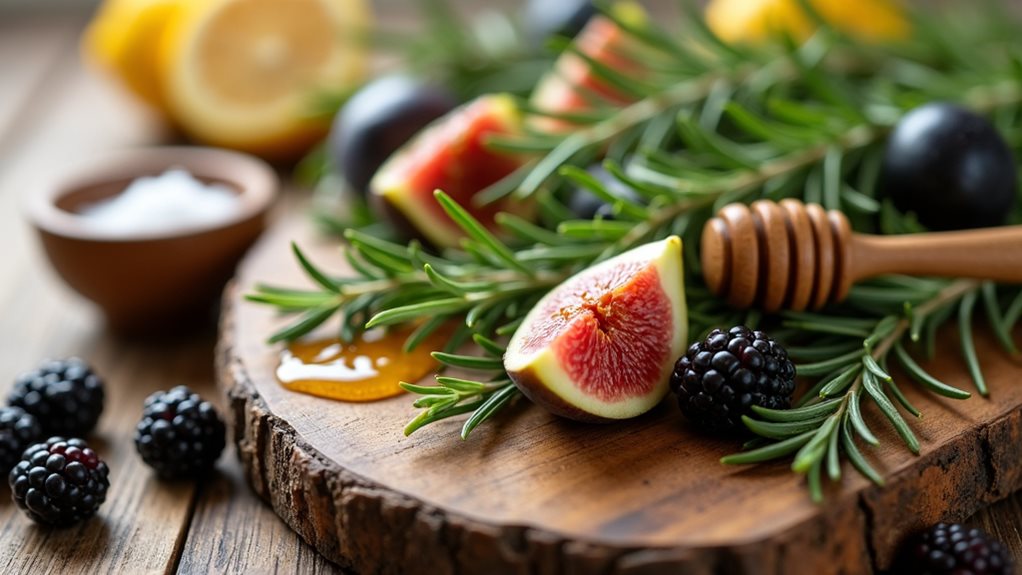
Although often associated with savory dishes, rosemary creates surprisingly delightful partnerships with various fruits, offering an unexpected bridge between sweet and savory flavor profiles.
You'll find this versatile herb enhances citrus desserts, particularly orange varieties like Navel and Cara Cara, when infused into a simple syrup. For a make-ahead treat, allow citrus slices to marinate in rosemary syrup, then garnish with pistachios and dates for textural contrast. This elegant dessert is especially refreshing after meals and provides a light conclusion to heavier courses.
Stone fruits, especially peaches, develop remarkable depth when roasted with rosemary sugar and finished with salted caramel. This flavor combination allows you to get creative with ingredients already available in your kitchen without requiring additional shopping trips.
For a revitalizing summer fruit salad, combine berries and peaches with a light drizzle of herb-infused syrup—you'll control the flavor intensity while adding complexity.
These combinations work equally well in raw presentations or cooked applications, giving you versatile options for innovative sweet-savory expressions.
Cheese and Rosemary: A Flavor Marriage
The pairing of cheese and rosemary creates one of the most celebrated flavor marriages in culinary tradition, dating back to the 1800s when innovative cheesemakers began incorporating herbs into their creations.
You'll find this aromatic herb enhances various cheese varieties, from sharp cheddar and nutty gouda to robust manchego and parmesan.
For the best flavor experience, try different rosemary infusion methods: rub dried leaves onto the rind, sprinkle over baked cheese dishes, or steep in olive oil for dipping. The cheese-making process ensures proper flavor infusion throughout the entire cheese while maintaining its natural qualities.
Rosemary pairs exceptionally well with Gruyère cheese, creating a harmonious combination that brings out the nutty characteristics of this Swiss variety.
Popular products like Sartori Asiago Rosemary and Oveja al Romero showcase this brilliant combination.
When serving, pair your rosemary-infused cheese with Chianti, Chardonnay, or a crisp American pale ale.
Complete your charcuterie board with Mediterranean accompaniments like olives and crusty bread for a sophisticated flavor experience.
For a festive holiday presentation, consider incorporating rosemary cheese into your Christmas gathering alongside a traditional pudding with brandy sauce for contrasting sweet and savory elements.
Enhancing Vegetables With Rosemary's Earthy Notes
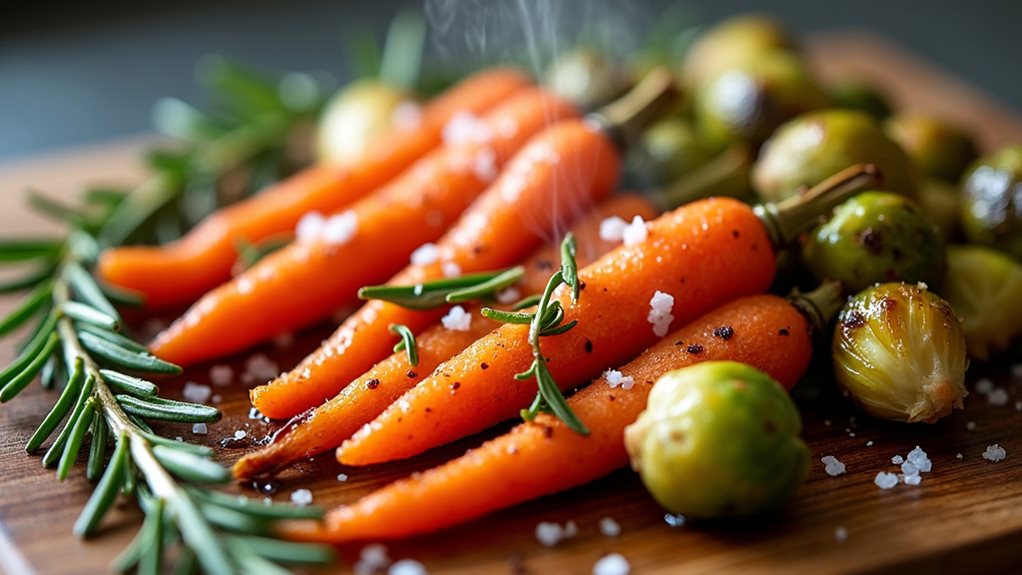
Rosemary's distinctive pine-like aroma and robust flavor profile make it an exceptional companion for vegetables, both in the garden and on your plate. When you're planning your vegetable roasting adventures, consider how this versatile herb enhances the natural sweetness of root vegetables like carrots, parsnips, and onions while simultaneously deterring their common pests in the garden.
For maximum impact, combine rosemary with garlic in your herb infusion techniques when preparing roasted vegetable medleys. This Mediterranean-inspired pairing works brilliantly with everything from leafy greens to cauliflower. Try tossing your veggies with olive oil base and let them marinate for 15-30 minutes before roasting to maximize flavor absorption.
You'll find that rosemary's woodsy notes transform ordinary vegetables into extraordinary dishes, especially when included in low-labor preparations like stews and casseroles. The herb's natural sweetness beautifully complements the earthy flavors of root vegetables in simple farm-to-table dishes. Arrange your garden strategically, placing rosemary near cabbage family plants to naturally repel pests while keeping water needs in mind. When creating your kitchen garden, consider planting rosemary with beans to achieve both pest protection and enhanced flavor profiles in your harvested crops.
Marinades, Sauces and Infusions With Rosemary
When crafting robust meat marinades with rosemary, you'll find that the herb's piney aroma infuses deeply into proteins like chicken and pork, especially when combined with citrus and garlic.
You can elevate your cooking by creating complex wine sauces that incorporate rosemary, which pairs exceptionally well with both red and white varieties to create rich, aromatic accompaniments.
Beyond marinades and sauces, try infusing oils and vinegars with rosemary for versatile flavor bases that'll transform everything from salad dressings to finishing drizzles.
Robust Meat Marinades
Diving into the world of robust meat marinades with rosemary opens up countless possibilities for transforming ordinary cuts into extraordinary meals. The piney herb creates a foundation that, when paired with garlic and olive oil, delivers exceptional meat tenderness.
For ideal results, consider your marinade duration carefully—tougher cuts benefit from overnight soaking, while delicate proteins need just 2-4 hours.
You'll find rosemary particularly versatile across various proteins. Beef sirloin develops complex flavors when marinated with rosemary, balsamic vinegar, and Worcestershire sauce.
Lamb becomes transcendent with lemon juice and garlic in the mix, while chicken takes on remarkable depth when honey balances the herb's intensity.
Whatever your choice—grilling, roasting, or pan-frying—these marinades infuse deep flavors while tenderizing effectively.
For maximum flavor development, consider beginning with a Maillard reaction by searing your marinated meat before slow-cooking to enhance both texture and taste complexity.
Complex Wine Sauces
The marriage of rosemary with wine creates sauces that transform ordinary dishes into restaurant-worthy experiences.
When crafting these sophisticated reductions, understand the wine characteristics first—bold Cabernet Sauvignon and Merlot complement rosemary's assertive profile in red wine sauces, while white wines offer delicate contrast when paired with seafood or poultry.
Master key sauce techniques by reducing your wine by half before introducing rosemary, creating intensified flavors without bitterness.
You'll find that combining rosemary with complementary herbs like thyme and bay leaves enhances complexity, while adding cream or butter smooths sharp edges.
For innovation, try Marsala with rosemary for chicken dishes—its nutty sweetness creates an unexpected flavor dimension.
Remember to manage heat carefully during reduction to preserve the herbs' aromatic qualities without scorching.
Unexpected Dessert Applications for Rosemary
Most people relegate rosemary to savory dishes, yet this versatile herb offers remarkable potential in the sweet domain of desserts.
You'll discover that rosemary ice creams deliver a sophisticated aromatic experience, especially when paired with honey or citrus bases. Try infusing warm cream with fresh sprigs before churning to capture rosemary's essence.
Similarly, rosemary sorbets offer a revitalizing alternative, particularly when combined with fruits like blackberry or lemon.
For an elegant dessert pairing, combine rosemary with dark chocolate in truffles or brownies. The herb's woodsy notes create depth without overwhelming sweetness.
Consider incorporating rosemary-infused olive oil into your next cake recipe, or add chopped rosemary to apple crumbles for an unexpected twist that will intrigue your guests' palates.
Frequently Asked Questions
Can Rosemary Be Used in Cocktails and Beverages?
Yes, you'll love adding rosemary to your cocktails! It's perfect for herbal infusions in beverages, whether you're creating rosemary cocktails with gin, vodka, or bourbon. Try it with citrus for innovative flavor combinations.
How Do You Properly Store Fresh Rosemary?
Like a fragile green treasure, your fresh rosemary stays vibrant when refrigerated in a damp paper towel inside a plastic bag. For longer preservation, try freezing rosemary in oil cubes—a game-changer for storing herbs year-round.
Is Dried Rosemary a Good Substitute for Fresh?
Dried rosemary can substitute fresh in a pinch, but you'll notice a fresh rosemary vs dried flavor potency comparison. Use 1/3 the amount of dried, as it's more concentrated despite having less vibrant notes.
Can Rosemary Be Used in Bread and Other Baked Goods?
Like a fragrant whispering in your kitchen, rosemary transforms ordinary dough into culinary poetry. You'll love experimenting with rosemary focaccia's aromatic crunch or the buttery richness of rosemary scones. They're game-changers for innovative bakers.
Are There Any Foods That Clash With Rosemary's Flavor Profile?
You'll find rosemary flavor clashes with delicate fish, sweet desserts, and mild herbs like parsley. These incompatible ingredients can be overwhelmed by rosemary's boldness unless you're deliberately creating an experimental contrast.
Final Thoughts
You've now journeyed through rosemary's aromatic landscape, discovering how this fragrant pine dancer can transform your cooking. From its rustic embrace with meats to its surprising whispers in desserts, rosemary offers endless possibilities. Don't hesitate to experiment beyond these pairings—your culinary intuition might uncover magical combinations we haven't mentioned. Remember, a little goes a long way with this potent herb. Your kitchen adventures with rosemary have only just begun.

